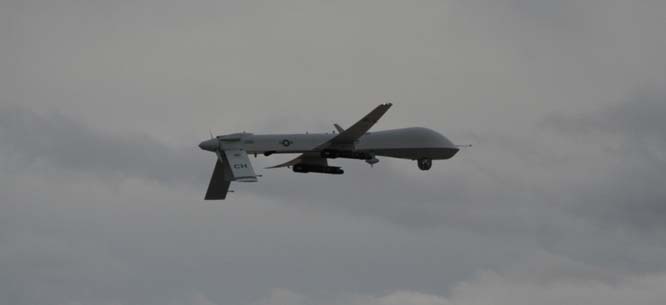Dissent on Drones
Dissent on Drones

Ever since its inception, the legal and ethical parameters for the “War on Terror” have been murky. Should it be subject to the same legal framework as a “real” war? Recent revelations about U.S. drone warfare have brought the debate back to life. Can targeted killings ever be justified? What if they compromise the basis of due process? And if so, does it matter whether killings are carried out by American soldiers or automated drones? What considerations, in short, should govern the ethics of drone warfare, and can it be governed at all?
Considering the secrecy with which the U.S. drone program has been implemented, the issue of transparency is paramount. “We citizens should know the criteria that are being used, the kind of evidence that is required, and we should know how the decisions are being made,” argued Michael Walzer in a recent live chat with the New Yorker’s Amy Davidson on drone warfare. “Should the president pull the trigger? Not by himself, not without the advice and consent of some group of people independent of his office and of the CIA.”
Going further in a recent online essay at Dissent, “Targeted Killing and Drone Warfare,” Walzer asked, “Why should we think it [the drone] different from the sniper’s rifle? The difference is that killing-by-drone is so much easier than other forms of targeted killing. The easiness should make us uneasy….We should think very carefully before relaxing the targeting rules and turning drones into a weapon like all the others.”
By most appearances, the U.S. government hasn’t set a very high threshold for using drones. But as news of remote pilots suffering post-traumatic stress suggests, killing-by-drone isn’t as clean as it seems. According to Willie Osterweil, “the major innovation of the drone is not the reduction of U.S. soldier suffering, but removing that suffering from the political calculus and ending the limits that suffering places on the capacity of military force.” But “while it’s much cheaper, socially, emotionally, and politically, to feed, train, house, and replace a pilot working in Kansas than in Kandahar, it costs much more economically”—“a win-win for the military industrial complex.”
Making public the criteria for ordering strikes and allowing independent oversight over decisions to deploy drones are important—but arguably these are smaller considerations next to the fundamental, contentious assumption that the U.S. government is “legally permitted to use lethal force against any of its operatives when the country involved is unwilling or unable to take action against the threat,” as Obama counterterrorism chief John Brennan has stated. As Rafia Zakaria put it last year in Dissent, the parameters for drone use outlined by Brennan
encompass both countries that consent and do not consent to U.S. strikes, cover a boundless geography (wherever al-Qaeda or associated groups may be), and allow the United States to decide for itself what proportionality and necessity entail, when these constraints are normally understood as concepts determined by international tribunals adjudicating the necessity of armed conflict.
Moreover, drone campaigns in Pakistan (the country subject to more drone attacks than any other) have “not reduced the ability of their supposed targets to kill with impunity”: “In the decade since September 11, 2001, a total of 322 drone strikes have battered the northwest tribal region of Pakistan. While those on American soil have fared well during that time, in 2011 alone 476 incidents of terrorist violence took place in Pakistan, killing 4,447 civilians, an increase from the previous year.”






